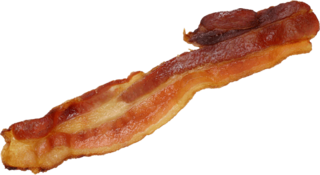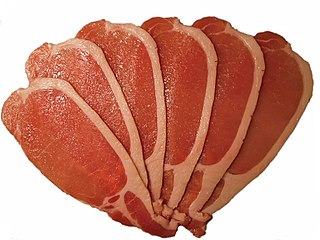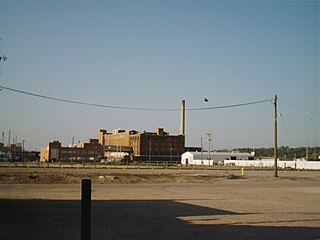
Bacon is a type of salt-cured pork made from various cuts, typically the belly or less fatty parts of the back. It is eaten as a side dish, used as a central ingredient (e.g., the bacon, lettuce, and tomato sandwich, or as a flavouring or accent.
The Rath Packing Company was a meatpacking company located in Waterloo, Iowa, between 1891 and 1985.

Back bacon is a cut of bacon that includes the pork loin from the back of the pig. It may also include a portion of the pork belly in the same cut. It is much leaner than side bacon made only from the pork belly. Back bacon is derived from the same cut used for pork chops. It is the most common cut of bacon used in British and Irish cuisine, where both smoked and unsmoked varieties of bacon are found.

The meat packing industry handles the slaughtering, processing, packaging, and distribution of meat from animals such as cattle, pigs, sheep and other livestock. Poultry is generally not included. This greater part of the entire meat industry is primarily focused on producing meat for human consumption, but it also yields a variety of by-products including hides, dried blood, protein meals such as meat & bone meal, and, through the process of rendering, fats.

Pancetta is a salt-cured pork belly salume. In Italy, it is often used to add depth to soups and pastas.
The Smithfield Packing Company sells meat products such as ham, ground pork, pork chops, bacon, and lunch meat. It sells its products worldwide. The company was founded in 1936. It is based in Smithfield, Virginia. It is part of Smithfield Foods which is in turn a subsidiary of WH Group.
Arbogast & Bastian was the name of a slaughterhouse and meat packing plant located in Allentown, Pennsylvania, United States. Once a national leader in hog slaughtering, the company had the capacity to process most of the 850,000 hogs raised annually in Pennsylvania for slaughtering. In its heyday, Arbogast & Bastian slaughtered an average of 4,000 hogs daily.

A bacon sandwich is a sandwich of cooked bacon between bread that is optionally spread with butter, and may be seasoned with ketchup or brown sauce. It is generally served hot. In some establishments the sandwich will be made from bread toasted on only one side, while other establishments serve it on the same roll as is used for hamburgers.

Maple Leaf Foods Inc. is a Canadian consumer packaged meats company. Its head office is in Mississauga, Ontario.

JBS USA Holdings, Inc. is an American food processing company and a wholly owned subsidiary of the Brazilian company JBS S.A. The subsidiary was created when JBS entered the U.S. market in 2007 with its purchase of Swift & Company. JBS specializes in Wagyu Beef, the only certified Japanese Cattle distributor on the entire eastern U.S. seaboard

Premium Brands Holdings Corporation is a Canadian specialty food manufacturing and distribution company. It is a publicly traded corporation on the Toronto Stock Exchange.

Wright Brand Foods, Inc. was a meat-packing company located in Vernon, Texas, that was eventually bought by the Tyson Foods corporation in 2001. Begun in 1922 by Egbert Eggleston, what would eventually become a multimillion-dollar business started out in the back of a local grocery store.
Cargill Meat Solutions is a subsidiary of the Minneapolis-based multinational agribusiness giant Cargill Inc, that comprises Cargill's North American beef, turkey, food service and food distribution businesses. Cargill Meat Solutions' corporate office is located in Wichita, Kansas, United States. Jody Horner is the division's president.

WH Group, formerly known as Shuanghui Group, is a publicly traded Chinese multinational meat and food processing company headquartered in Hong Kong. Sometimes also known as Shineway Group in English-speaking countries, the company's businesses include hog raising, consumer meat products, flavoring products, and logistics. It is the largest meat producer in China.

Peameal bacon is a wet-cured, unsmoked back bacon made from trimmed lean boneless pork loin rolled in cornmeal. It is found mainly in Ontario. Toronto pork packer William Davies, who came to Canada from England in 1854, is credited with its development.
William Henry Davies was a British-born Canadian businessman who established a company that packed and shipped salt pork from Toronto to the United Kingdom. The William Davies Company grew to be the largest pork packer in the British Empire, giving Toronto its nickname of "Hogtown", and introducing peameal bacon.

The Swift & Co. meatpacking plant in Sioux City, in the state of Iowa in the Midwestern United States, was built in 1918–19 as a speculative venture under the name Midland Packing Plant. After going into receivership, it was acquired by Swift & Co. in 1924, and continued to operate until 1974. It was then purchased by a Sioux City businessman and converted to an enclosed mall, the KD Stockyards Station. The building was listed in the National Register of Historic Places in 1979.
Ontario Stockyards is a livestock auction facility located in Cookstown, Ontario and serves much of Southern Ontario in selling cattle, pork and other livestock from producers to buyers to process as meat.

The meat industry has been severely affected by the COVID-19 pandemic in the United States. Outbreaks of the virus have taken place in factories operated by the meat packing industry and the poultry processing industry. These outbreaks affected dozens of plants, leading to closures of some factories and disruption of others, and posed a significant threat to the meat supply in the United States. By April 27, 2020, there were at least 115 facilities with cases across 23 states, and at least 4,913 workers diagnosed positive with COVID-19, or approximately 3 percent of the workforce, with 20 deaths reported. By May 5, over 10,000 meatpacking plant workers in 29 states and working at 170 plants had tested positive for the coronavirus. At least 45 of those meat industry workers had died. As of May 20, at least 15,300 workers have been infected with COVID-19 at 192 different meatpacking plants in the United States, based on ongoing reporting by the Midwest Center for Investigative Reporting and USA Today. At least 63 of those workers have died from the disease.

During the COVID-19 pandemic in Canada, outbreaks of the virus took place in factories operated by the meat packing industry and the poultry processing industry. These outbreaks affected multiple plants, leading to closures of some factories and disruption of others, and posing a threat to the food supply in Canada.
















